Eggplants are a beloved staple in many kitchen gardens, celebrated for their delicious and versatile nature. Companion Plants for Eggplants are being increasingly adopted to improve growth, yield, and pest resistance as part of a thoughtful approach to sustainable agriculture. This strategy uses the natural synergies between plant species to mutual advantage. Here we learn the Best Companion Plants for Eggplants, including the reasons for selecting specific companion plants, their benefits, and the possible detrimental effects of Bad Companion Plants for Eggplants.
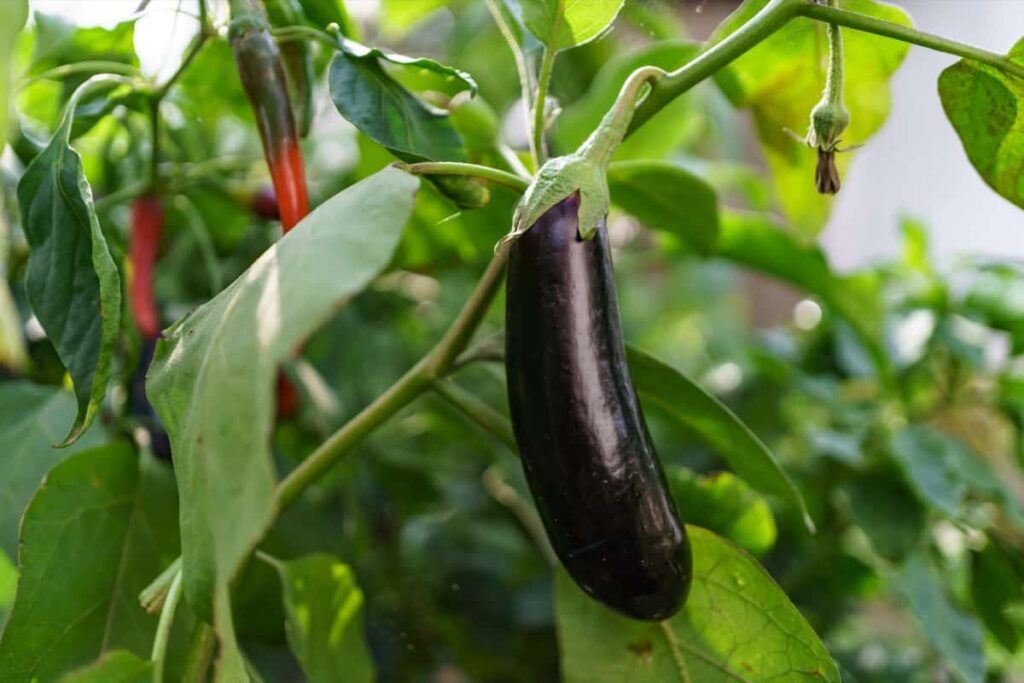
Benefits of Companion Plants for Eggplants in the Garden
Companion planting creates a garden ecosystem that promotes healthier plant growth and can reduce the need for artificial inputs such as fertilizers or pesticides. The concept behind Eggplant Companion Plants Benefits involves providing a supportive, growing environment for the eggplant by pairing it with other plants that offer complementary characteristics. For instance, some plants can enhance the growth of eggplants by improving soil fertility, attracting beneficial insects, or deterring harmful pests.
Best Companion Plants for Eggplants to Deter Pests
Identifying the Best Companion Plants for Eggplants to Deter Pests is a key strategy in successful eggplant cultivation. Plants such as marigolds and calendula are well-regarded for their pest-deterring properties. Their strong scent confuses pests that may harm eggplants, providing a natural pest defense. Simultaneously, their bright flowers attract beneficial insects, providing dual protection for your eggplants. But the story is not all positive, as some plants may not be so beneficial.
In case you missed it: Profitable Organic Eggplant/Brinjal Cultivation in West Bengal: A Production Guide for Beginners
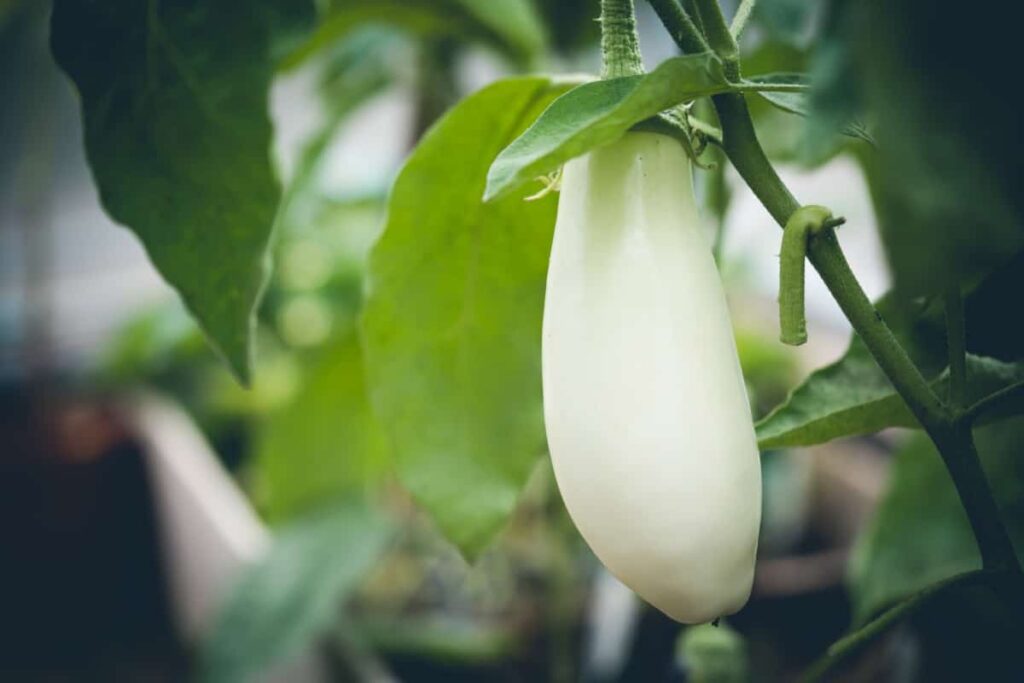
Bad Eggplant Companion Plants
Understanding the potential negative effects of certain plant associations on eggplants is equally important. There are beneficial partnerships, but there are also Bad Companion Plants for Eggplants. For instance, the proximity of fennel or any kind of kohlrabi can inhibit the growth of eggplants, potentially reducing their yield. Therefore, being aware of these combinations is crucial to avoid unintentionally harming your eggplants.
Eggplant Companion Plants for Improved Pollination
Companion planting can also play a key role in improving the pollination rates of eggplants. For instance, flowering plants such as borage or bee balm are excellent Eggplant Companion Plants for Improved Pollination. These flowers attract bees and other pollinators, boosting the chances of eggplant flowers being pollinated and subsequently developing into ripe, healthy fruit.
Companion Plants for Eggplant in Containers
Container gardening often requires more careful planning due to space constraints. Here, it’s important to consider Companion Plants for Eggplant in Containers that share similar needs regarding sunlight, water, and soil type. Plants such as dwarf marigolds or sweet alyssum can be excellent companions for eggplants in container gardens, offering pest-deterrent properties and attracting pollinators while not competing heavily for root space.
Companion Herbs for Eggplants in Organic Gardening
The choice of Companion Herbs for Eggplants in organic gardening can make a considerable difference. Herbs such as basil, mint, or oregano not only enhance the overall health of the eggplant but also repel many common pests. Plus, they can bring an additional layer of fragrance and color to your garden, not to mention their uses in your kitchen!
In case you missed it: How to Grow Eggplants in Raised Beds: Step-by-Step Guide to Planting and Care
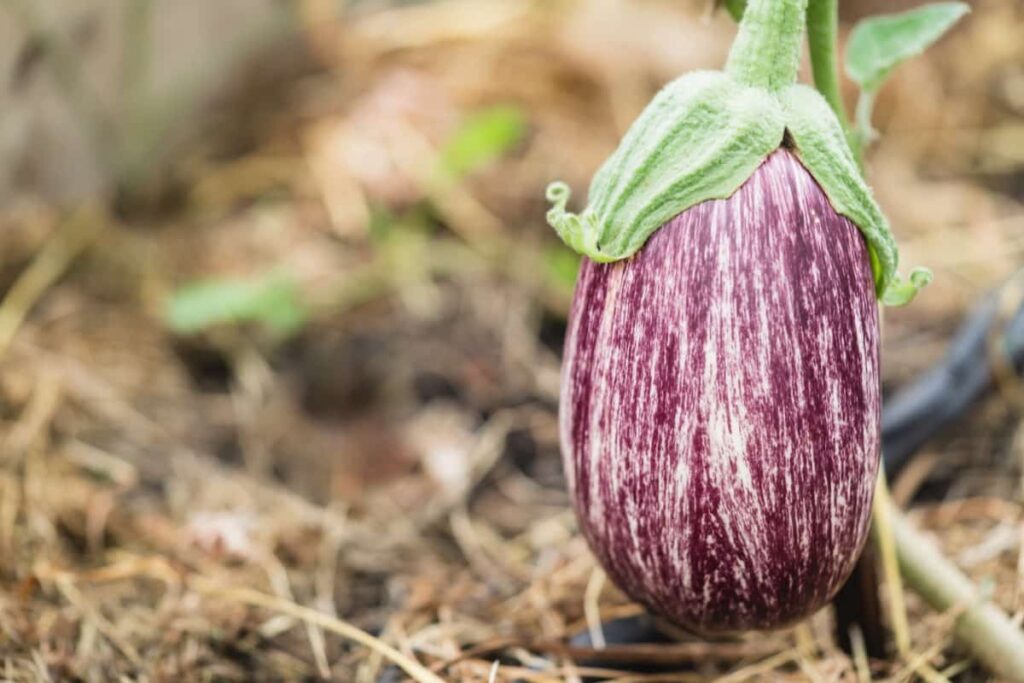
Flowering Companion Plants for Eggplants to Attract Beneficial Insects
When it comes to attracting beneficial insects, nothing works better than flowers. In this context, it’s worth considering Flowering Companion Plants for Eggplants to Attract Beneficial Insects. Nasturtiums and marigolds, for example, are excellent choices. They attract predatory insects like ladybugs and lacewings, which control pest populations, helping eggplants thrive.
Companion Vegetables for Eggplants in Raised Beds
Raised beds provide a different set of conditions and possibilities for companion planting. Choosing the right Companion Vegetables for Eggplants in Raised Beds is crucial to maximize space and promote plant health. Plants such as beans and peppers are often excellent companions for eggplants in raised beds. They share similar growth requirements and can beneficially intermingle, deter pests and promote pollination.
Companion Plants for Eggplants to Improve Soil Fertility
Soil fertility is a crucial aspect of gardening. Companion Plants for Eggplants to Improve Soil Fertility can greatly affect your eggplant yield. Legumes, for instance, are known to improve soil fertility by fixing nitrogen, a vital nutrient for eggplants. Planting beans or peas alongside eggplants can help to naturally enrich the soil and promote healthier, more robust eggplants.
In case you missed it: How to Start Brinjal Farming/Eggplant in West Bengal: Planting to Harvesting Guide for Beginners
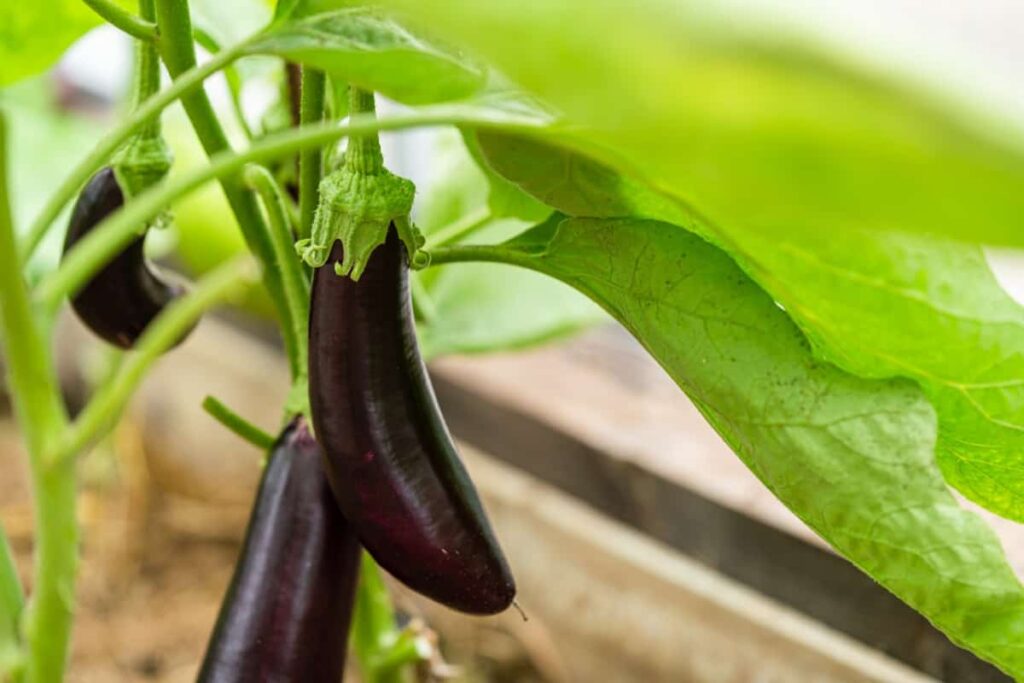
Companion Plants Chart for Eggplants in the Garden
| Companion Plant | Benefits |
| Marigolds | Deters pests with their scent, attracts beneficial insects |
| Calendula | Confuses pests with strong scent, attracts pollinators |
| Borage | Attracts bees and other pollinators, improves pollination rates |
| Sweet Alyssum | Serves well in container gardening, attracts beneficial insects |
| Basil, Mint, Oregano | Deters pests, enhances overall health of eggplant |
| Nasturtiums | Attracts beneficial insects, helps in pest control |
| Beans | Improves soil fertility by fixing nitrogen |
| Peas | Enriches soil, promotes healthier eggplants |
| Tomatoes | Provides shade, confuses and deters common pests |
| Potatoes | Loosens soil for better root development, provides living mulch |
| Spinach | Acts as a living mulch, allows for dual cropping |
| Cucumbers | Shares similar growing conditions and growth habits |
In case you missed it: How to Start Eggplant/Brinjal Farming in Malaysia: Check How this Guide Helps to Grow Eggplant
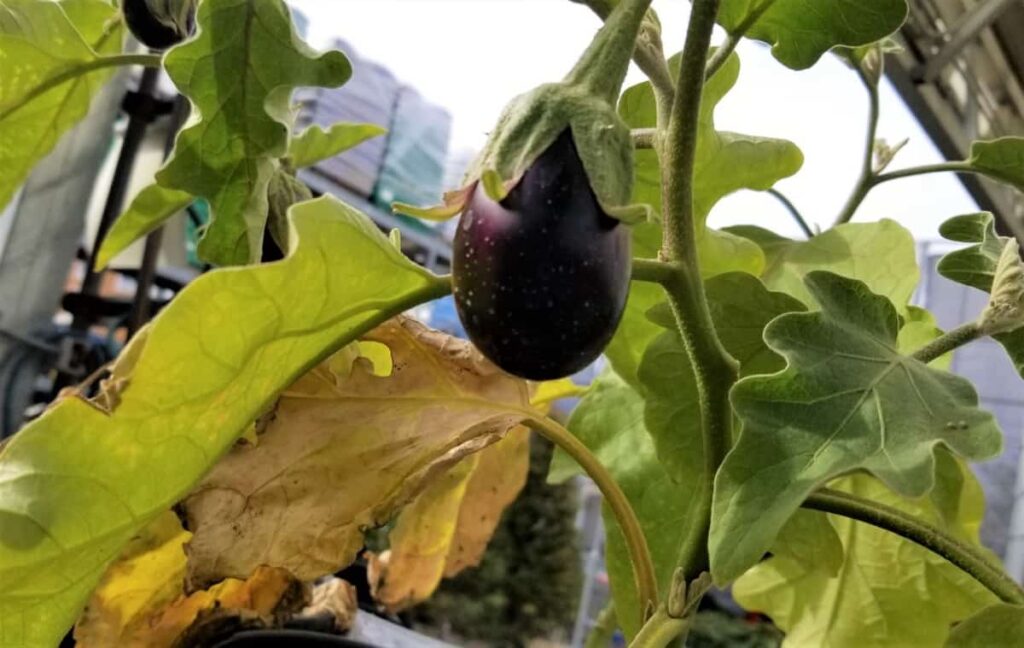
Eggplant and Tomato: An Ideal Pairing
When considering a fruitful partnership, the pairing of eggplant and tomato should be highly considered. Tomatoes can serve as a fantastic companion to eggplants for several reasons. Tomatoes have a robust growth pattern and can provide ample shade to the lower-growing eggplants, helping them avoid sunscald in summer.
Additionally, tomatoes and eggplants share many common pests, and when planted together, the strong scent of tomato plants can help confuse and deter these pests. The answer to the question, “Can eggplants grow with tomatoes?” is a resounding yes, making them an ideal combination in the garden.
Growing Eggplants with Potatoes: A Balanced Ecosystem
Another question gardeners often ask is, “Can eggplants grow with potatoes?” Surprisingly, the answer is yes. Although they belong to the same family and share some common pests, growing these two plants together can create a balanced ecosystem. While the lush foliage of the eggplant can provide a living mulch for the potato plants, protecting them from sun exposure, the deep-growing nature of potatoes can help loosen the soil, thereby promoting better root development for the eggplants. This symbiotic relationship makes them suitable companions in a well-planned garden.
In case you missed it: Best Practices to Grow Brinjal/Eggplant at Home: Check How this Guide Helps Beginners

Conclusion
The question, “What Grows Well With Eggplant?” has a variety of answers, all of which can contribute positively to your eggplant cultivation experience. Similarly, knowing “What Should You Not Plant Next to Eggplant?” is equally important to ensure that your eggplant has the best chance of producing a bountiful harvest. Finally, regarding the question, “Can Eggplant Grow With Cucumbers?” they can! They share similar growing conditions and have complementary growth habits, making them good garden companions.
- Crops Grown in Summer Season: Best Choices for Summer Gardening
- Organic Pest Control for Tomato Farming
- How to Maximize Sheep Farming Profit
- Broccoli Varieties: Choosing the Right Cultivars for Your Farm
- How to Raise Pigs in Your Own Backyard: A Comprehensive Guide
- Budget Friendly Sheep Shed Ideas: Cheap and Low-Cost Tips
- How Much Do Cattle Farmers Make: Revenue Streams in Cattle Farming
- Management Pests and Diseases in Your Cotton Field
- Sheep Farming Business Plan for Beginners
- Aquaponic Farming at Home: A Step-By-Step Guide
- Profitable Village Farming Business Ideas in 2024
- High-Yield Aquaculture: Fast-Growing Fish for Farming
- Effective Fish Pond Construction Techniques for Beginners
- Irrigation and Water Management in Pineapple Farming
- Blossom to Harvest: Mastering Flowering and Pollination in Papaya Farming
- Pig Fattening Essentials: From Selection to Sale for Beginners
- Raising Wagyu Cattle: A Complete Guide for Premium Beef Production
- Soil Types and Their Water Holding Capacity
- Optimizing Irrigation Schedules for Coconut Groves for Enhanced Yield
- Espresso Your Garden: Coffee Grounds for Healthier Acid-Loving Plants
- The Best Soil Mix for Snake Plants: How to Mix Your Own Snake Plant Soil
- Green Thumb Success: Expert Tips for Cultivating Greenhouse Beans All Year Round
- Bloom All Year Round: The Ultimate Guide to Indoor Hyacinth Care
- Eco-Friendly Gardening: How to Make Liquid Fertilizer from Kitchen Waste
- Ultimate Guide to Grow Anise in Pots: Explore Seed Propagation to Harvesting
- Guide to Raising Chester White Pigs: Discover Breed Facts to Growth Management
- Mastering the Elegance: The Ultimate Guide to Weeping Cherry Tree Care, Planting, and Maintenance
- Ultimate Guide to Planting Garlic in Grow Bags: Growing Strategies for Beginners
- How to Fix Spider Plant Leaf-Related Problems: Natural and Organic Remedies
- 10 Reasons Why Your Tulsi Plant is Shedding Leaves: Home Remedies and Solutions
- Optimizing Growth and Yield: The Advantages of Palm Bunch Ash Fertilizer
- Utilizing Neem Oil Extract as a Natural Pesticide for Hydrangea
- From Soil to Harvest: Various Ways in Which Farmers Can Use AI Tools
- Steps to Encourage and Induce Citrus Flowers: A Comprehensive Guide
- How to Fix Snake Plant Leaf-Related Issues: Natural and Organic Remedies
- Transform Your Garden into a Fragrant Oasis with Raat Ki Rani (Night Blooming Jasmine)
